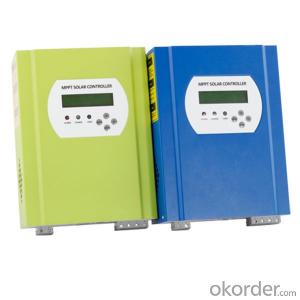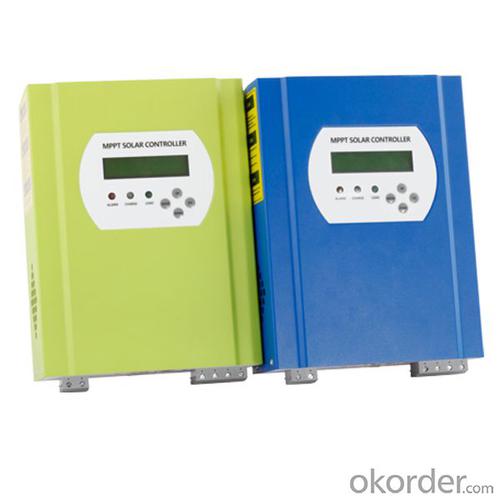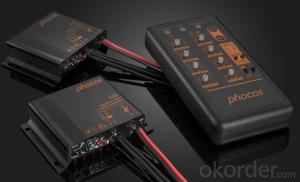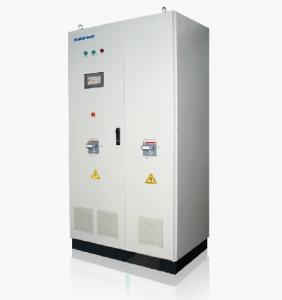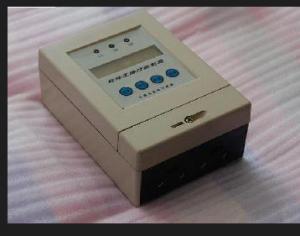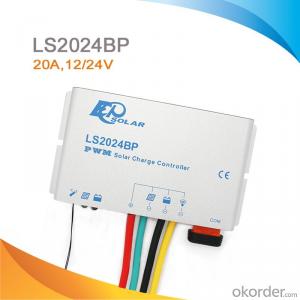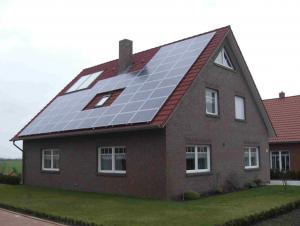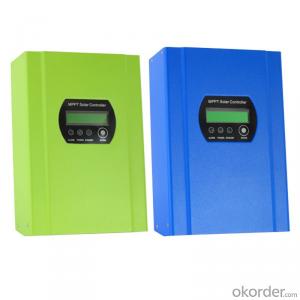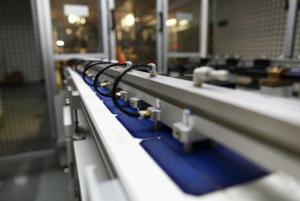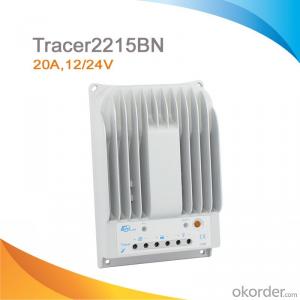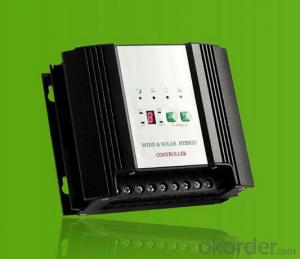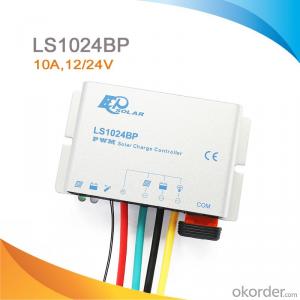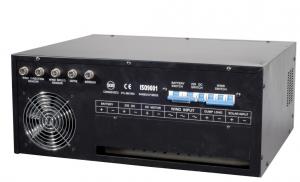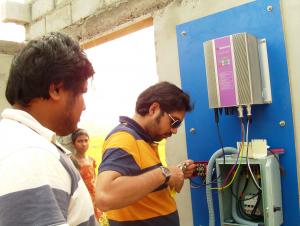Best Charge Controllers for Solar:DC 12V/24V/48V Auto Work 20A Solar MPPT Battery Charger Controller
- Loading Port:
- China main port
- Payment Terms:
- TT OR LC
- Min Order Qty:
- 20 unit
- Supply Capability:
- 9999 unit/month
OKorder Service Pledge
OKorder Financial Service
You Might Also Like
Smart2 20A Solar MPPT Battery Charger Controller
More Pictures
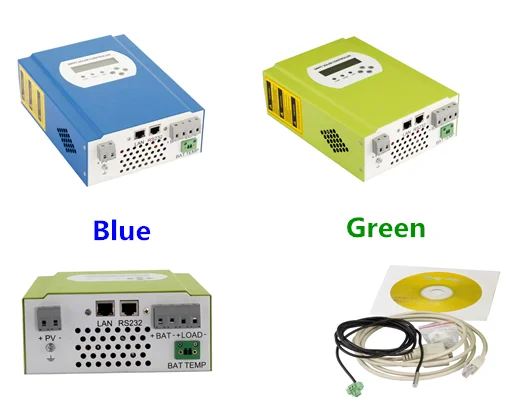
LAN/RS232 connecting
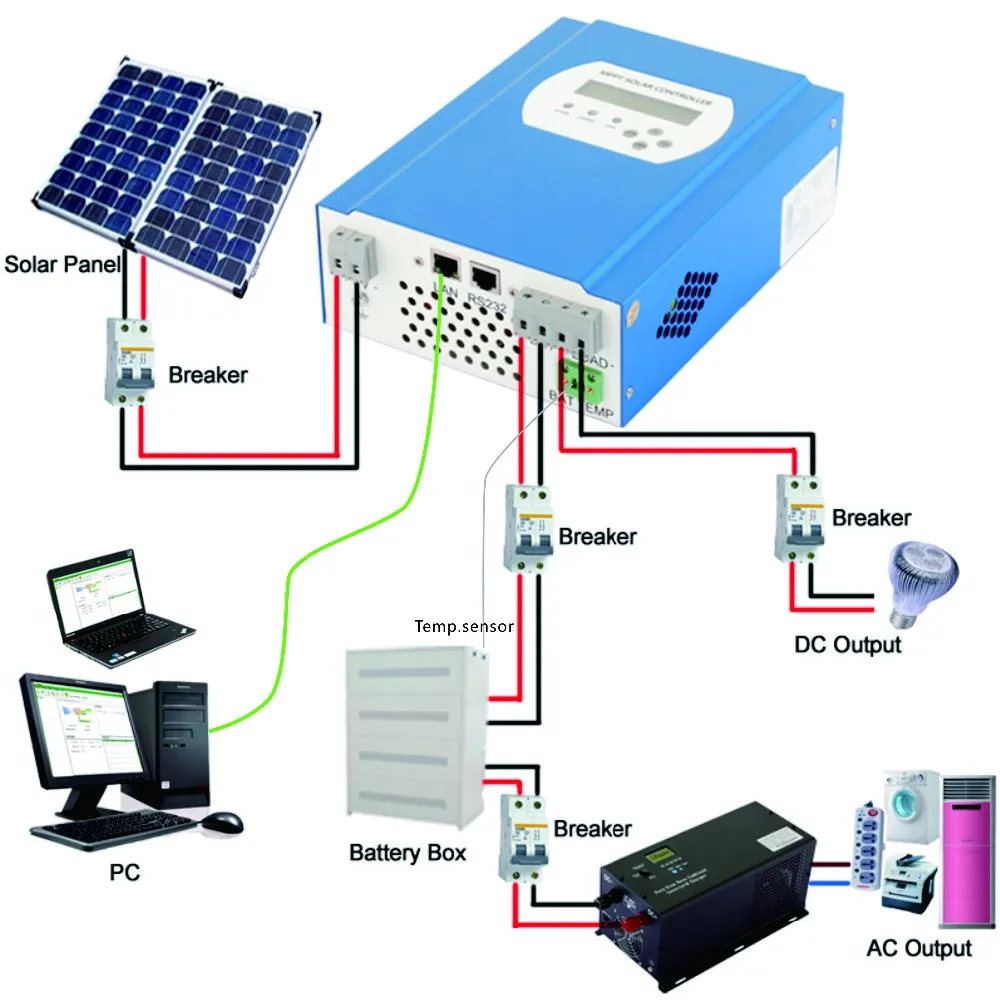
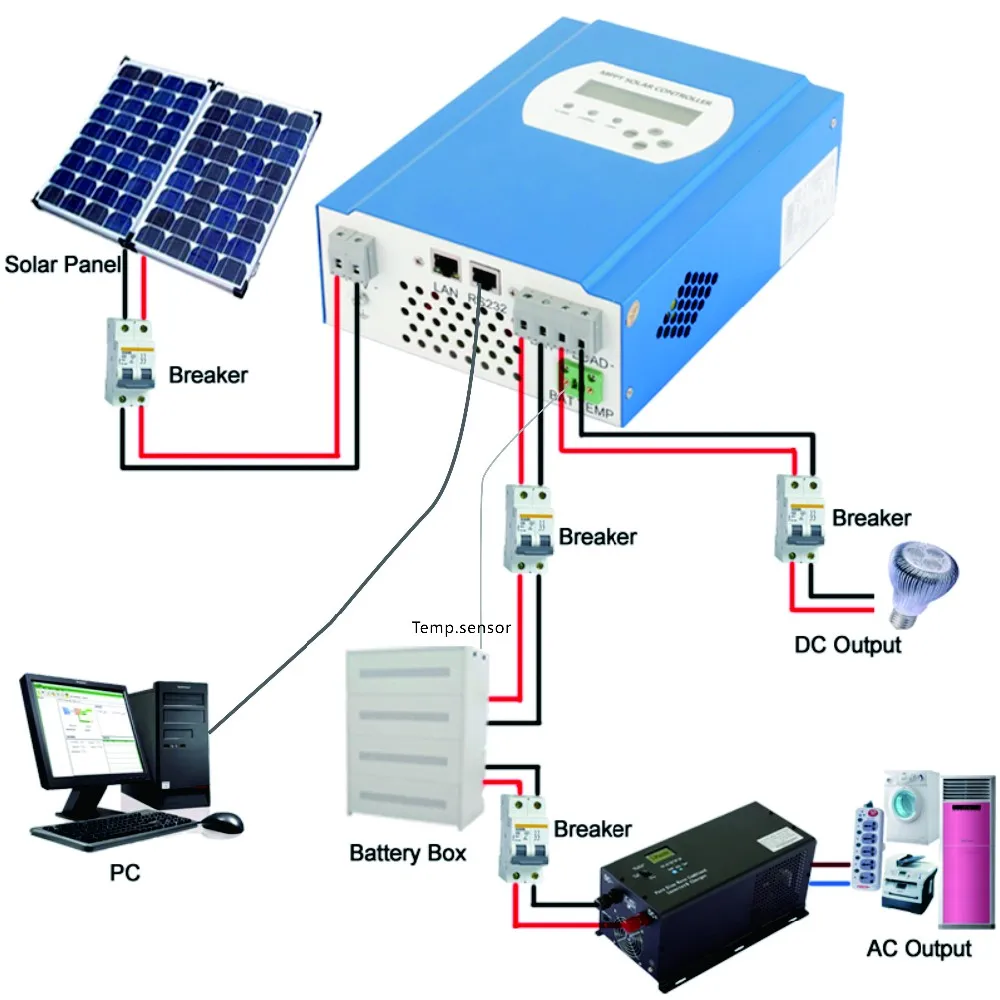
Upper PC software (real time monitor)
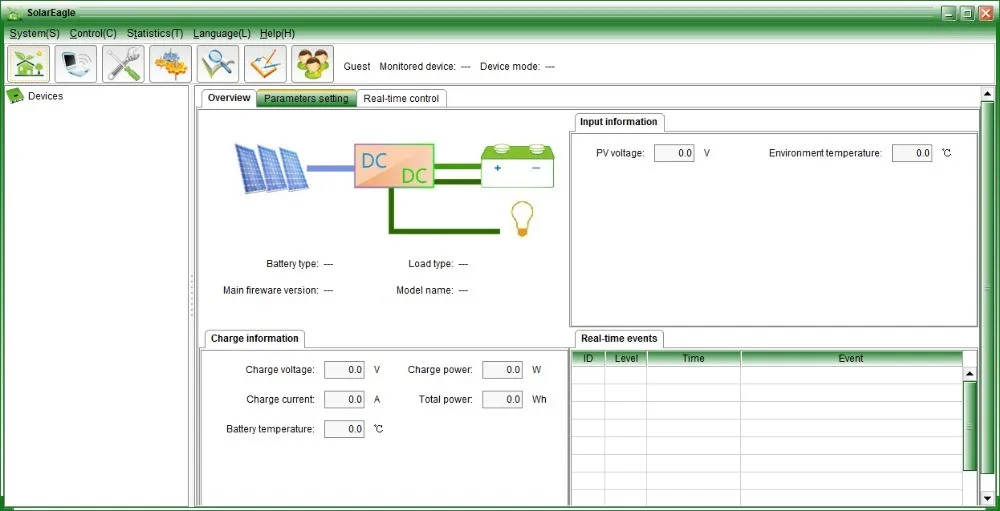
Application
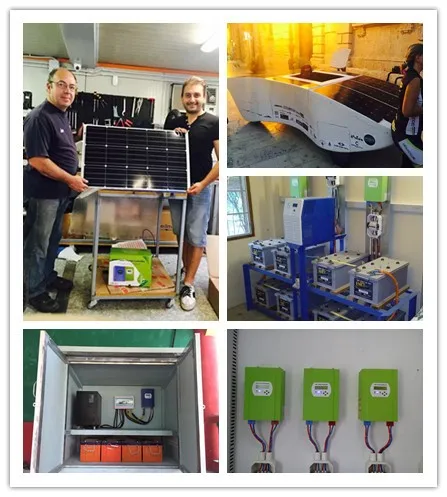
Feature
1. MPPT charging mode, conversion efficiency upto 99%
2. Maximum PV input voltage up to DC150V
3. RS232 and LAN communication port
4.Discharge mode: ON/OFF mode, double time control mode, PV voltage control mode, PV voltage+time delay mode.
5.LCD and LED show various parameters
6. Controllers can be connected in unlimited parallels
7. CE,RoHS, FCC certification approved
8. 2 years warranty, lifelong free technical service.
Parameter
| Model:I-P-SMART2-20A/25A/30A -series | 20A | 25A | 30A | ||
| Charge Mode | Maximum Power Point Tracking | ||||
| Method | 3 stages: fast charge(MPPT),constant voltage, floating charge | ||||
| System Type | DC12V/24V/48V | Automatic recognition | |||
| PV Modules Utilization Rate | 12V/24V/48Vsystem | ≥99% | |||
| Input Characteristics | |||||
| MPPT Working Voltage and Range | 12V system | DC18V~DC150V | |||
| 24V system | DC34~DC150V | ||||
| 48V system | DC65~DC150V | ||||
| Input Overvoltage Protection Point | 12V/24V/48V system | DC150V | |||
| Max. PV Power | 12V system | 286W | 357W | 429W | |
| 24V system | 572W | 715W | 858W | ||
| 48V system | 1144W | 1430W | 1716W | ||
| Output Characteristics | |||||
| Selectable Battery Types | 12V/24V/48Vsystem | Sealed lead acid, vented, Gel, NiCd battery | |||
| (Default type is GEL battery) | (Other types of the batteries also can be defined) | ||||
| Rated Output Current | 12V/24V/48V system | 20A | 25A | 30A | |
| Physical | |||||
| Pc (communication port) | RS232 or LAN | ||||
| Measurement D*W*H(mm) | 220*165*70mm | ||||
| N.G(kg) | 2kg | ||||
| Color | Blue/Green/OEM (optional) | ||||
| Safety | CE, RoHS,FCC | ||||
Certifications |
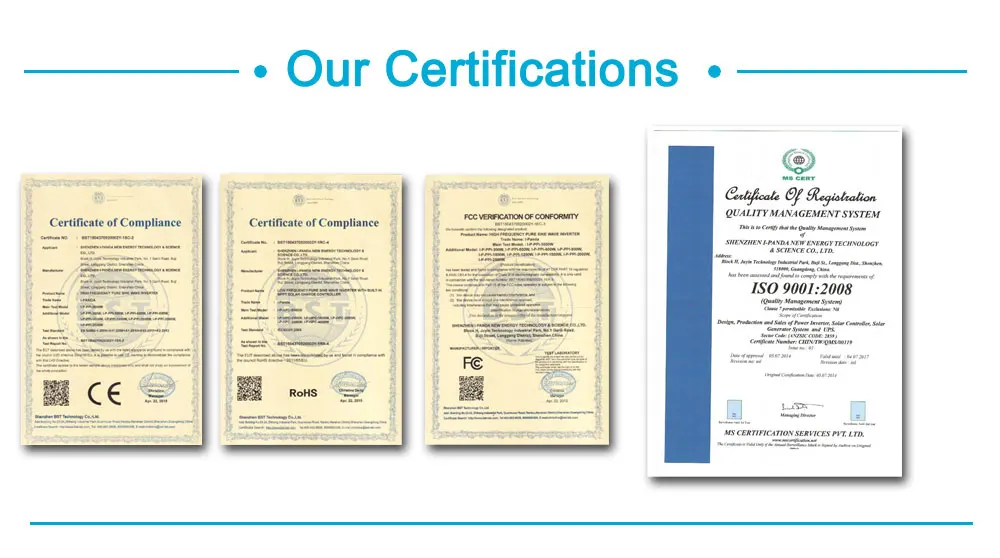
F&Q: |
Q1. How to ensure and monitor the products quality?
A1: We have established a perfect Quality Management System, In strict
accordance with ISO9001: 2008 quality system and ISO14001 environment system for quality assurance management;
Our ISO9001:2008 Quality System certificate encoding: CHIN/TW/QMS/00119;
Our ISO14001 Environment System certificate encoding: CHIN/TW/EMS/00028;
Q2. What is the warranty of products?
A2: The warranty period of different products are different; 5 years, 3 years, 2 years, 1 years; More details please refer to the product specification or manual; we will provide free life-long technical support ;
Q3. What is the difference between MPPT&PWM?
A3. MPPT charging mode, peak efficiency up to 99%, saving 30%~60% solar panel than traditional PWM controller.
- Q: Can a solar controller be used with a solar-powered agricultural farm?
- Yes, a solar controller can be used with a solar-powered agricultural farm. A solar controller helps regulate and optimize the charging and discharging of batteries in a solar power system. By using a solar controller, the farm can effectively manage and control the energy generated by the solar panels, ensuring efficient and reliable power supply for various agricultural operations.
- Q: What is the role of a solar controller in preventing battery self-discharge?
- The prevention of battery self-discharge is of utmost importance and requires a multifaceted approach, in which the solar controller plays a vital role. The solar controller, also referred to as a charge controller or regulator, acts as a mediator between the solar panels and the battery bank in a solar power system. Its primary function is to regulate the flow of charge from the solar panels to the batteries, ensuring an efficient and effective charging process. One key method employed by a solar controller to prevent battery self-discharge is the implementation of a "low voltage disconnect" mechanism. This feature constantly monitors the battery voltage and automatically disconnects the battery from the solar panels when the voltage drops below a specific threshold. By preventing the battery from discharging beyond a safe level, the solar controller safeguards the battery against damage and extends its lifespan. Furthermore, the solar controller plays a critical role in preventing battery overcharging. Excess energy generated by the solar panels can cause the batteries to overheat and potentially fail. The solar controller addresses this issue by regulating the charging process, ensuring that the batteries receive an appropriate level of charge based on their capacity and current state of charge. Moreover, the solar controller often incorporates advanced technologies such as "pulse width modulation" (PWM) or "maximum power point tracking" (MPPT). These technologies optimize the energy transfer from the solar panels to the batteries by adjusting the voltage and current levels to match the battery's requirements. This optimization enhances charging efficiency and minimizes energy losses, effectively reducing the likelihood of battery self-discharge. In conclusion, the solar controller's role in preventing battery self-discharge encompasses the regulation of the charging process, protection against overcharging and overheating, and optimization of energy transfer. By fulfilling these functions, the solar controller ensures that the batteries remain charged, healthy, and ready for use, thereby preventing self-discharge and maximizing their performance and lifespan.
- Q: Can a solar controller be used for off-grid solar systems?
- Yes, a solar controller can be used for off-grid solar systems. The controller regulates the flow of electricity from the solar panels to the batteries, ensuring efficient charging and preventing overcharging. It is an essential component for off-grid systems as it helps manage and optimize the use of solar energy.
- Q: Can a solar controller handle power surges from the charge controller?
- Yes, a solar controller can handle power surges from the charge controller. Solar controllers are designed to regulate and control the flow of power from the charge controller to the battery or load. They often have built-in protection features such as surge protection, overvoltage protection, and short circuit protection, which help prevent damage from power surges.
- Q: Can a solar controller be used with a battery bank that is connected in series?
- Yes, a solar controller can be used with a battery bank that is connected in series. The solar controller's main purpose is to regulate the charging of the batteries, regardless of whether they are connected in series or parallel. It ensures that each battery receives an equal charge and prevents overcharging or undercharging.
- Q: Are there any energy-saving features in a solar controller?
- Solar controllers typically have various energy-saving features. One notable feature is their ability to regulate and optimize battery charging in the solar system. This ensures efficient charging, preventing overcharging and extending battery lifespan. Additionally, solar controllers often include a low voltage disconnect (LVD) feature. When the battery voltage drops below a certain level, the load automatically disconnects to prevent excessive discharge, which can harm the batteries. Some advanced solar controllers even have maximum power point tracking (MPPT) technology. This technology continuously adjusts voltage and current to match ideal operating conditions, maximizing energy harvested from the solar panels. As a result, the overall energy efficiency of the solar system is significantly improved.
- Q: Can a solar controller be used with a solar-powered pool heating system?
- Yes, a solar controller can be used with a solar-powered pool heating system. A solar controller helps regulate the flow of water through the system, ensuring efficient heat transfer from the solar panels to the pool. It can also monitor and adjust temperature settings, provide system diagnostics, and automate operations, enhancing the overall performance and functionality of the solar-powered pool heating system.
- Q: How does a solar controller handle battery reconditioning?
- A solar controller can handle battery reconditioning by implementing a specific charging profile that includes a series of controlled discharge and charge cycles. This process helps to remove sulfation from the battery plates, which is a common cause of battery degradation. The controller monitors the battery voltage, temperature, and other parameters to ensure that the reconditioning process is safe and effective. By optimizing the charging algorithm, the controller can extend the overall lifespan and performance of the battery.
- Q: Can a solar controller be used with solar-powered backpacks?
- Yes, a solar controller can be used with solar-powered backpacks. A solar controller is responsible for regulating the voltage and current from the solar panels to ensure proper charging of the battery or device. In the case of solar-powered backpacks, a solar controller can be used to manage the energy flow from the solar panels to the battery or the electronic devices being charged. It helps prevent overcharging, overvoltage, or other potential issues that could damage the battery or the connected devices. Therefore, using a solar controller with solar-powered backpacks is highly recommended to optimize the charging process and ensure the longevity and safe operation of the system.
- Q: Can a solar controller be used with solar water heating systems?
- Yes, a solar controller can be used with solar water heating systems. The solar controller helps to regulate and control the flow of heat transfer fluid in the system, ensuring optimal performance and efficiency. It monitors and adjusts the temperature, ensuring that the water is heated to the desired level without overheating.
Send your message to us
Best Charge Controllers for Solar:DC 12V/24V/48V Auto Work 20A Solar MPPT Battery Charger Controller
- Loading Port:
- China main port
- Payment Terms:
- TT OR LC
- Min Order Qty:
- 20 unit
- Supply Capability:
- 9999 unit/month
OKorder Service Pledge
OKorder Financial Service
Similar products
Hot products
Hot Searches
Related keywords
